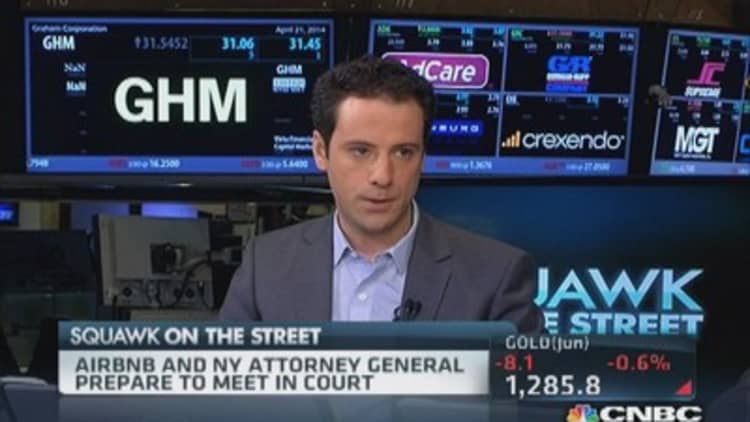Peer-to-peer home rental site Airbnb had its day in court Tuesday but will have to wait to find out if a New York judge will order it to turn over user data to the attorney general, who asserts many of the 15,000 users in New York City are operating illegally.
"Today, the Attorney General again made it clear that he remains determined to comb through the personal information of thousands of regular New Yorkers just trying to make ends meet," Airbnb posted on its website late Tuesday afternoon. "We were proud to stand up for our hosts who share their homes and against this over-broad, government-sponsored fishing expedition. Cities like Paris, Amsterdam and Hamburg are embracing the sharing economy and New York shouldn't be stuck playing catch-up."
Since October, New York State Attorney General Eric Schneiderman has been seeking to enforce a subpoena to gain access of the user data on the 15,000 or so hosts who offer rooms in New York City through Airbnb. After several postponements, Judge Gerald W.Connolly in the Supreme Court of the State of New York, County of Albany, on Tuesday heard arguments from both sides.
The judge reserved his decision and will issue his ruling sometime in the future, according to the court clerk's office.
"Despite all of AirBnb's rhetoric, the company has never denied that substantial illegal activity is taking place on its site," said Matt Mittenthal, spokesman for Attorney General Schneiderman. "To the contrary, AirBnb decided before our hearing to remove 2,000 listings posted by "bad actors"– hardly isolated cases. The Attorney General will continue to stand up for the law that protects building residents and tourists alike, and we await the judge's decision."
The Schneiderman filing seeks the data to enforce the New York City law pertaining to short-term rentals.
"It is illegal for residents of Class A [multiple dwelling] buildings to rent out their apartments for any period of time less than 30 days unless they are also present in the apartment," the AG's office stated in its November rebuttal to Airbnb's attempt to quash the subpoena.
As of Jan. 31 this year, there were 19,522 NYC listings on Airbnb with 15,677 unique hosts, according to a follow-up affidavit filed by the AG's office Monday. Of those, 1,849 hosts had multiple listings, and that 12 percent accounted for 30 percent of all the NYC listings on the site. Only one of the 15,677 required a stay of longer than 30 days.
For its part, Airbnb has stated it's willing to start collecting hotel-type taxes on behalf of its hosts if New York state law was changed to let the company do the collection rather than require individual users handle the taxes. If Airbnb starts collecting taxes, it estimates it will hand over $21 million annually to the state and city.
On Monday, the company said it is already working to weed out more than 2,000 New York City listings that "weren't delivering the kind of hospitality our guests expect and deserve."
"Our efforts to review and strengthen our community in New York are ongoing," Airbnb said on its blog Monday."We are a young company, we are constantly learning. We are committed to making cities better and will, to the extent possible, investigate complaints when we receive them. And we will be taking even more steps to make communities stronger in the years ahead. We look forward to continuing to work with our community and city leaders around the world as the sharing economy moves ahead."
Juiced by a recent round of private investment capital, San Francisco-based Airbnb now has an estimated value of about $10 billion, according to The New York Times,
The total tax on a typical NYC hotel room is 14.75 percent plus $3.50 per room per night, according to NYC & Company, the city's official tourism group. Currently there are more than 500 hotels in the city.
The average daily room rate in New York City was $222 in March, according to research firm STR.
Although thousands of people use the website, it has its enemies.
"Airbnb facilitates the proliferation of unlicensed, unregulated and potentially unsafe facilities that many hosts treat as a lucrative part-time business," Lisa Linden, spokeswoman for the Hotel Association of NYC said in a statement to CNBC ahead of the ruling. "Few cities have the compression and volume of housing that NYC has. These illegal facilities are impinging on available housing stock, lost revenue for the city and potential job losses for the tourism industry. We support the efforts of elected officials, including Attorney General Eric Schneiderman, regarding enforcement of the law."
New York wouldn't be the first location where Airbnb users are paying hotel-type taxes. Those charges are now in the works in both San Francisco and Portland, Ore. And Palm Springs, Calif. has a formal licensing and tax structure for people who rent out all or part of their homes. The city has issued more than 1,300 of the $200 annual permits. The hosts, in turn charge must pay the city the 11.5 percent transit occupancy tax, which results in an extra $3 million annually for Palm Springs.
—By CNBC's Amy Langfield

Follow Road Warrior on Twitter at @CNBCtravel.


